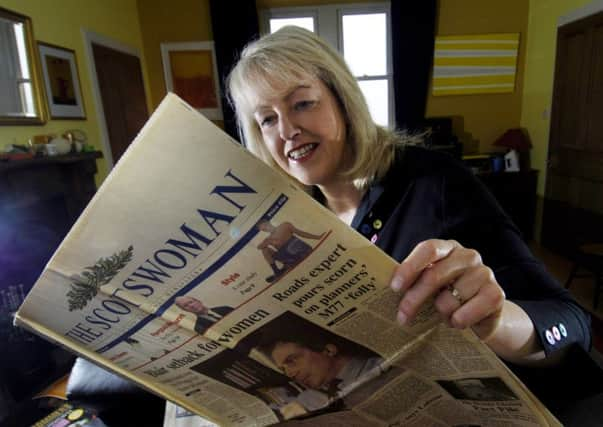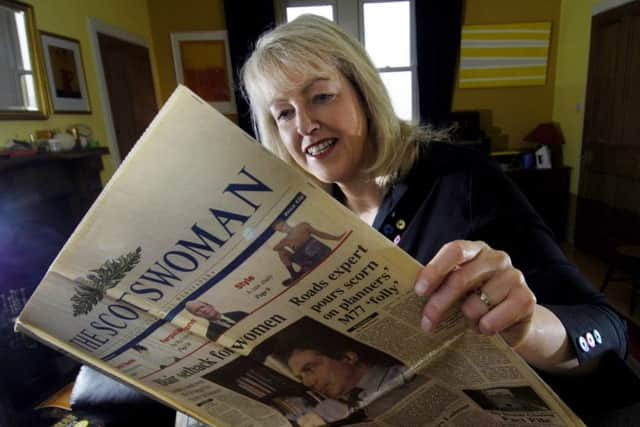Kayt Turner: 21 years on, Scotswomen were always as good as men


There were no mobile phones, few computers and the majority of the staff smoked – at their desks. But the strong women of the Scotman argued their case and The Scotswoman was born.
We may have been few in number back in 1995, but it wasn’t that much of a stretch to put a woman at the head of each department. Nor were we parachuting women into positions just for appearances sake. Then, as now, the picture editor was female. The deputies for news, business and production were women. The only department that had a concern was sport. And that was because all their female staff were out on the road – at the coalface as it were.
Advertisement
Hide AdAdvertisement
Hide AdThat’s still the case for us. What has changed is that female sports writers have long stopped being the rarities that they once were. Where writers lead, referees follow, eh?


Yes, we were patronised and occasionally asked to make the tea (having suffered my tea making skills, they didn’t ask twice.) But if I’m completely honest, a great deal of that treatment had more to do with our age. We were young – much, much younger than the majority of men that we worked with.
And it was our youth and relative lack of experience that they ridiculed – not our gender. These crusty aul’ men grumped at us all to learn, do our jobs as well as we possibly could and – most importantly – to speak up for ourselves. ‘Get Gobby or Get Going’’ was how my boss at the time described it to me.
If we were to follow their simple rules, they said, we’d all end up as editors of our own papers before we knew it.
We weren’t required to be twice as good as the men. It was enough that we were –like the men – better than everyone else out there. We were to ask questions of everyone and make sure that we weren’t overlooked. Yes, some of them were absolute pigs to work with but I’ve worked for and with more than a few women who were as bad (if not worse).


So, what – if anything – has changed over the intervening 21 years? Aside from the fact that the following year The Scotswoman was reduced to a supplement inside the paper rather than the main event? It’s still a man in charge – albeit he didn’t have to be talked into doing this special, it was his own idea to revive it.
The gender balance in our newsroom nowadays is now more equal – say 60/40 than the 80/20 of 20-odd years ago. Women are evenly represented in all our departments and crack the whip in more than a few of them. The change is that no-one thinks anything of it – why would they?
Advertisement
Hide AdAdvertisement
Hide AdThe men we work alongside now have been brought up by feminist mothers, have strong-minded wives and girlfriends and – where applicable – want the same for their daughters.
What hasn’t changed is the parental responsibilities of the staff. All these women in all these departments – are primarily child free. Their male equivalents are – in the main – fathers. Any mothers in the newsroom tend to work part-time.
The press is notoriously problematic in fitting in with child-rearing. It’s hard to time nursery pick ups around breaking news stories. Difficult to get any child care when you’re working shifts that don’t finish until the very early or late hours.
Newspapers may have grasped that mothers make up a great portion of their readership – but they still seem to find it difficult to square it with the possibility that any of their workforce are.
Of course, that’s a problem in almost every other industry. Even the teaching profession – once the fail-safe option for mothers who wanted to continue working – is finding it difficult to retain staff once they go on maternity leave.
The cost and provision of childcare is a problem for every working mother – and father. I’m not saying that the gender war has been won. Childcare provision would go some way to helping. But so would equality in parenting duties. The aul’ fellas from our 1995 newsroom had one thing right – teach your girls to speak up for themselves. They should have told us that what we should have been speaking up for was better childcare. That way, we could ALL have had the opportunity to become editors of our own newspapers.
And maybe that future editor of The Scotsman will decide that her paper doesn’t need to do a Scotswoman. Perhaps she’ll do a Scotsperson instead.